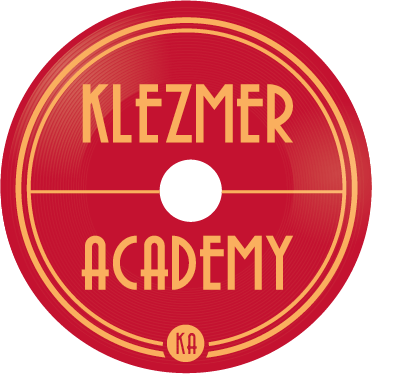This month's tune is something a little bit different. For one thing, there are no other recordings of it for comparison. It's not even, strictly speaking, part of the Yiddish repertoire. But I think it will be very interesting for a number of reasons.
Let me begin by admitting that I have a certain fondness for polkas. When I was nine years old and wanting to sign up for band, my mother's cousin Seymour, who had played clarinet in an army band in WWII, took out his horn and played the Clarinet Polka for me, and I was mesmerized. It sounded like water splashing down a waterfall, and I knew I needed to be able to play like that.
"The Clarinet Polka" actually does have a Yiddish connection. Under one of its Polish titles, "Dyadushka,", Dave Tarras recorded it in the late 1950s with Murray Lehrer on volume 3 of Freilachs in Hi-Fi. The text on the sleeve says about this tune:
"The Clarinet Polka is a showpiece for Tarras' very live licorice stick. He has played it often under its original -- Dyadushka Polka (Grandfather's Polka). If the granddads to whom it is dedicated can dance this breath-snatcher, more power to them and to Dave Tarras too, who though a granddad himself, can blow down many a younger man. The trumpet's darker tones outline the Pierrot-like agility of the clarinet...."
That description of Tarras's playing applies equally to this month's tune, a polka that he wrote and recorded in 1920 called "Mlody Bortnik" (the Young Boarder). This was an exclusively Polish release on the Victor label. Tarras made a number of Polish releases, all billed as Instr. Kwartet Tarasiewicza.
What is special about this polka, and the reason that I chose to highlight it here, is that unlike most such tunes, its melody is modal rather than major in tonality, and it moves in very interesting ways between C freygish and F harmonic minor.
The polka begins with a four-bar intro that sounds like someone took a typical dance hall intro and klezmerized it.
The cadence at the end of this intro, C maj - Bb minor - C major, is classic freygish, but when the actual tune begins, it is clearly in F harmonic minor. It is an amazing, virtuosic melody that is pure Tarras, and classic F harmonic minor. And he plays it purely, his notes clean and articulate, as befits a good polka. Interestingly, despite the modal nature of the tune, Tarras's style includes none of the ornaments that give his Jewish playing its yidishn tam (Jewish flavor)
The second section again rests briefly in C freygish before moving back squarely into F minor. The third section, a typical "trio" in F minor's relative major, Ab, offers no surprises but provides a nice contrast to the Eastern European modality of the main polka melody.
Tarras's exceptional playing contrasts rather dramatically with that of the the accordion player, who tends to express a somewhat simplified version of the melody and at times fumbles some of the modal runs.
All in all, Mlody Bortnik would make a fine addition to any klezmer repertoire.
Downloadable versions of the complete chart and the Tarras recording can be found in the Resources section.



